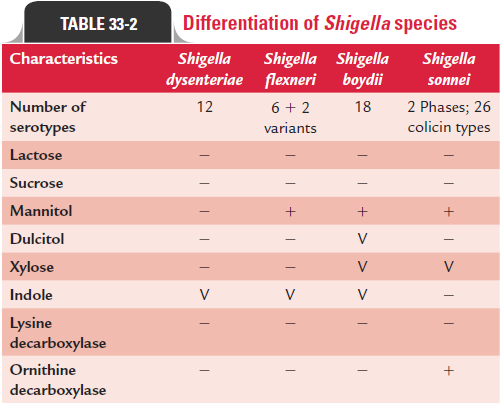Chapter: Microbiology and Immunology: Bacteriology: Shigella
Shigella: Properties of the Bacteria
Properties of the Bacteria
◗ Morphology
Shigella shows following features:
· Shigella are short, Gram-negative rods, about 0.531–3mmin size.
· They are nonmotile, nonsporing, and noncapsulated.
· Shigella species with exceptions of S. flexneri, serotype 6, andsome strains of other serotypes possess fimbriae.
◗ Culture
Shigella are aerobes and facultative anaerobes. They grow at atemperature range of 10–40°C with an optimum temperature of 37°C and pH 7.4.
a)Nutrient agar: They grow on ordinary media, such as nutrientagar or Mueller–Hinton agar. Shigella colonies on nutrient agar, after overnight incubation, are small, circular, convex, smooth, and translucent. Occasionally on primary isolation and frequently in subcultures, a proportion of the colonies may be of the rough type.
b) MacConkey agar: Shigellaspp. on MacConkey agar producenonlactose-fermenting pale, colorless colonies. However, S. son-nei(which ferments lactose late) forms pale pink colonies onprolonged incubation.
c) Selective media: Deoxycholate citrate agar (DCA), xyloselysine deoxycholate (XLD) agar, Salmonella–Shigella (SS) agar, and Hektoen enteric (HE) agar are frequently used selective media for isolation of Shigella species. DCA is a useful selec-tive medium for isolation of Shigella spp. from feces. On this medium, Shigella spp. produce small colonies, which on pro-longed incubation produce lactose-fermenting pink colonies. XLD agar is another selective medium, which is less inhibitory to S. dysenteriae and S. flexneri.Shigella spp. forms red colonies on this medium. Shigella spp. on SS agar form colorless colonies. Shigella spp. on HE agar forms green colonies.
d) Liquid media: Selenite F and Gram-negative (GN) brothare commonly used enrichment media. Enrichment of feces in GN broth for 4–6 hours followed by subculture on XLD or HE medium is useful for isolation of Shigella from clinical specimens.
◗ Biochemical reactions
Shigella shows following reactions:
· Shigella ferments mannitol, forming acid but no gas. Manni-tol fermentation test is an important biochemical test, which is used to classify shigellae into mannitol-fermenting and -nonfermenting species. S. flexneri, S. boydii, and S. sonnei are mannitol-fermenting species, while S. dysenteriae is mannitol-nonfermenting species. However, exceptions are not that uncommon.
· Shigella also ferments glucose, producing acid but withoutgas. Newcastle and Manchester biotypes of S. flexneri type 6, and some strains of S. boydii types 13 and 14 are exceptions, which do not ferment glucose.
· They do not ferment lactose, sucrose, salicin, adonitol, or inositol. However, S. sonnei ferments lactose and sucrose late.
· They reduce nitrates to nitrites and do not form H2S.
· They are MR positive, citrate negative, and oxidase negative.
· They are catalase positive with exception of S. dysenteriae type 1, which is catalase negative.
The biochemical characteristics that are useful for distinguish-ing different Shigella species are listed in Table 33-2.

◗ Other properties
Susceptibility to physical and chemical agents: Shigellaeare killed at a temperature of 55°C in 1 hour or by 1% phenol in 30 minutes. In feces, they die within a few hours due to acidity produced by the growth of intestinal bacteria. They remain viable in moist environments for days, but die rapidly on drying. S. sonnei is in general more resistant to unfavorable environmental conditions than the other Shigella species.
Related Topics